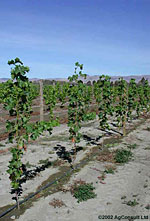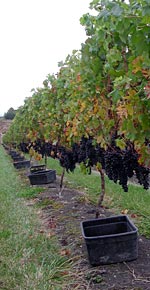|
|
SOIL & LEAF TEST INTERPRETATION
|
AgConsult
specialises in soil fertility and plant nutrition, especially
for viticulture. In operation since 1988, we have provided
independent fertiliser advice to farmers and growers throughout
New Zealand. AgConsult Ltd works with a number of companies
and individual advisers in the field where we provide comprehensive
reports for growers, with fertiliser recommendations based
on soil/petiole/leaf test results. A large percentage of our
work relates to viticulture.
>
tests offered |
|
|
RESEARCH &
DEVELOPMENT
|
In the last
six years we have expanded into Research and Development and
General Consulting, with particular attention to issues like
soil use sustainability and effects on soil biological activity
and soil organic matter.
AgConsult Ltd has been closely involved with the development
and field testing of a number of different products on the
market today. We have been contracted to do field trials with
a large number of different products on grapevines, pasture,
kiwifruit, pip fruit etc. Specific areas of research included
general nutrient availability, effect of type of application,
vine disease resistance, calcium uptake in apples, general
crop quality etc.
>
research & development |

Pasture Application Trial
|
|
TRAINING
EDUCATION &
PRESENTATIONS
|
We have organised training sessions
and courses relating to soils, soil fertility and soil biological
activity for a number of our clients. Our senior consultant
Gerard Besamusca has been involved in numerous seminars relating
to soils and viticulture/horticulture and is regularly invited
to give presentations on relevant subjects. He is a member of
the NZIAS (New Zealand Institute of Agricultural Science), NZSHS
(New Zealand Society for Horticultural Science), ISHS (International
Society for Horticultural Science), and is CPAg accredited.
|
|
|
VITICULTURE

Vine Establishment Trial
(Australia)
|
|
Most of our
clients are involved with grapegrowing. There is a growing
awareness of the importance between soil characteristics,
soil management and nutrition on the one hand, and (grape
and wine) quality parameters on the other hand.
Soil and vine management can greatly affect
yield and quality. Understanding the processes involved means
there is a potential for managing a number of important quality
parameters in the wine making process. Examples are Potassium
and must pH, Acidity, Ammonium and YAN nitrogen (stuck fermentations),
colour and bouquet, sugars and tannins.
To manage these parameters effectively, monitoring
soil and petiole/blade nutrient levels is essential. Obviously
close communication with the wine makers is also required
(juice/must analysis). Some varieties can have significantly
different desired or medium petiole and blade nutrient levels.
Rootstocks affect the rate at which elements like potassium,
magnesium, calcium and nitrogen are taken up by the vine.
Many grapegrowers routinely take soil and petiole
samples. Any responses to the findings of these tests are
usually only aimed at maintaining vine physiological minimum
nutrient levels with little eye for the crop in terms of yield
or desired quality parameters.
It is this void that we are trying to fill with
our consultancy. By using more comprehensive soils tests,
regular petiole and blade testing, the aim is to promote healthy
vines which grow the desired quality grape. This means taking
into account the effects of canopy management, covercrops
and climate.
Databases can be built up using all this information to compare
effects of different treatments on wine quality for each vineyard
or vineyard block.

|
|
|
SOIL HEALTH
|
|
One
special area of interest is the role soil biological activity
plays in maintaining vine health and crop quality. Soil microorganisms,
including beneficial mycorrhizal fungi, play a major role
in nutrient uptake of the vine. These organisms also help
protect the vine against nematode attack and other pathogens.
Optimum soil biological activity for a paddock
producing pasture is quite different from the optimum soil
biological environment required for grapegrowing. In the latter
case we need more fungal biomass including mycorrhizal fungi
to create a typical vine environment in the soil. Promoting
mycorrhizal fungi will dramatically increase the total soil
volume the vine will have access to source water and nutrients,
and will benefit uptake of elements like phosphorus, zinc
and calcium.
Promoting or maintaining optimum levels of soil
biological activity for grape growing is one of the goals
of vineyard soil management. It will not only enhance vine
nutrition and vine health, it will also help maintain soil
health long-term, and in the case of newly planted vines help
their establishment.

|
|
DISEASE RESISTANCE
 |
|
Grapevines have natural
abilities to resist pathogen attack. This ability varies between
varieties, and also depends on environmental factors.
Understanding more about how the vine’s
own “immune” system works, help us produce stronger
and more resistant vines. Although it may not always be possible
to completely discard fungicide use, it certainly seems possible
to reduce the need for fungicides and/or increase the efficiency
of fungicide use.
One of the ways we can do this is by using (natural)
elicitors that can “prime” the vines immune system
so it is better prepared against pathogen attack. By eliciting
the vine’s immune response, a number of defence compounds
are produced within the vine (and grapes). One of the more
important such compounds is Resveratrol. Resveratrol is a
plant defence chemical (phytoalexin) that is involved in imparting
a level of disease resistance to the plant.
Helping to increase the vine’s resistance
to pathogen attack can also be done by promoting beneficial
microorganisms on the leaf surface.
A healthy leaf contains many different microorganisms on the
leaf surface. Under normal conditions they will help resist
pathogen invasion by competition (food and space) as well
as the production of specific antimicrobial substances that
help keep pathogens at bay. Unfortunately, in many vineyards
management has reduced the presence of a diverse and beneficial
population of microorganisms.

|
|
INTEGRATION
|
Too
often, soil and fertiliser management is only reactive and not
integrated. If soil samples show deficiencies some fertiliser
will be applied. If petiole samples show deficiencies a foliar
spray may be applied. However, typically here is no coherent
nutrient, soil and vine management system in place. Information
from soil samples and petioles is not used to its full potential
and is not properly retained for easy future access.

|
|
|
|
|

|
|
 |
|

